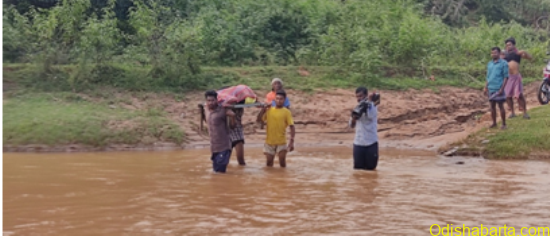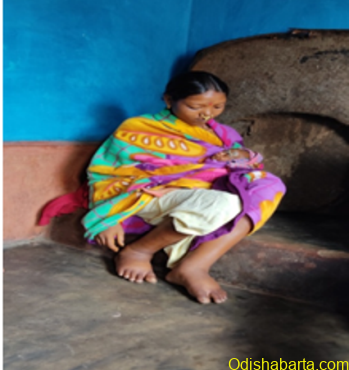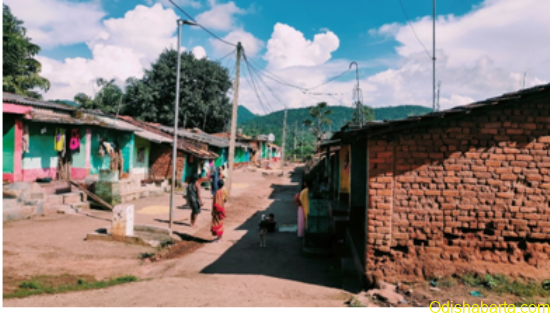Drenched with problems, this village still got a ray of hope due to the willingness of its residents and health workers.

By Shakti Swarupa Pattnaik

Odishabarta

Koraput,( Baghamari Village of Laxmipur Block): The death of her first child as a stillbirth left Ichai Mandingya in a grieve stricken state making her numb to go to the hospital for the delivery of her fourth child even after ten years of the death of her first.

Ichai Mandingya, a 35 years old lady gave birth to her 3rd child, a boy at Baghamari village, a hard-to-reach area that falls under the Pipalpadar sub-centre of the Laxmipur block, Koraput district. Ten years back she lost her first child as a stillbirth during her seventh month of pregnancy due to lack of blood. She was taken to the nearby Community Health Centre at Laxmipur by crossing the river carried in a bed from where she walked to Pipalpadar to get the ambulance service. The village people had to walk two kilometres just to get the phone network to call the ambulance. The child couldn’t survive.
After ten years, coordinator Mr. Arata Takri and frontline health workers visited her during the 7th month of her pregnancy in August 2022, they found that she was severely anaemic with a haemoglobin rate of 4 gm%. The team advised her to go to the community health centre immediately but she was reluctant as the trauma of her past stillbirth incident didn’t allow her to think otherwise. The severity of her condition was made clear to her husband and other family members, who finally convinced her to go to the health centre. Baghamari being a hard-to-reach area, had several obstacles before the woman could reach the health centre. First, she had to cross a small river, and then take a kaccha mud road which in itself is almost 2 kilometres away from the main access road to the village. Seeing the pregnant woman struggling to take this journey that would save her and her baby’s life, the entire village came to her rescue.
Together with her husband and the team of frontline health workers including Mr. Takri, the villagers accompanied the woman and the ambulance waiting on the main road that would take her to the health centre. She reached the health centre and was then taken to the Laxmipur hospital, where she received the much-needed iron injections and is currently undergoing further treatment. However due to the unavailability of blood, she was further referred to Koraput hospital. But to her dismay she was deprived of receiving proper treatment there due to the insufficiency of beds at Saheed Laxman Nayak Medical. Frustrated from the situation she eloped from the hospital.
People of Baghamari village carrying a patient to cross a huge river situated at the entrance of the village.
“The problem due to transportation comes, at last. We have a systematic issue in reaching people at the hamlet due to which Ichai couldn’t get a proper check-up and ended up being severely anaemic at the 7th month of her pregnancy despite having door-to-door visits by ASHA, ANM, and VHND, which is organized once every month. In UNICEF, we can advocate for more bike ambulances and ensure regular health check-ups in the hamlets.” – Dr. Brajesh Merta, Health Officer, UNICEF, Odisha.
The ASHA worker of Baghamari, Mrs. Subhranti Miniaka says- “chua heleka emiti hauchi madam, jo mananka chua nahi au pregnant haunahanti, semane healthy rahuchanti”. – During pregnancy only such issues happen madam, those who aren’t pregnant, they remain healthy. In order to negate incidents like that of Ichai, the ASHA worker of her village, the Anganwadi didi, did the required to ensure the successful delivery of Icchai’s fourth child. ASHA worker Mrs. Subhranti Miniaka, the Anganwadi didi Mrs. Nibedita Majhi, spread awareness in the village to go for medical check-ups, They took the initiative to call the ambulance, ANM (Auxiliary Nurse and Midwife) workers for regular checks up, MHU vehicles, and made other arrangements to ensure that the mother and child are healthy and treated well. Provided proper nutrition and calcium, and iron tablets during pregnancy- chatua powder, khaja, and eggs every Tuesday. Provided the bank and other details to their supervisor Laalumati Sarkar of Laxmipur to implement ‘Janani Suraksha Yojana’ and ‘Mamata Yojana”. Made people aware of Ante Natal check-up and Post Natal check-ups and prevention of infection in the reproductive tract.
The village Disari Pengoli Mandingya and 12 adolescent girl workers spread awareness on the dos and don’ts during and after pregnancy, how to take proper care of child and mother by providing proper nutrition, bathing techniques, and health check-ups. Cleared out the blind beliefs Ichai had when she lost her child in medical 10 years ago and pushed her to go to the health centre again.
Ichai’s family members, her husband Baida Mandingya, who works as a farmer, leaves the village at 8AM and returns at 6PM, and her mother-in-law Motai Mandingya, despite financial restraints and transportation difficulties, motivated Ichai to go to the health centre, which is 15 km away from the village.
Volunteer workers Subhash Mandingya and other male members of the village gave selfless service to take the pregnant lady to the CHC on the stretcher and crossing a river and a long muddy road and still made it up to her. Coordinators like Mr. Arata Takri, a gentleman with a vision to help pregnant women in hard-to-reach areas.
“On the level of community, difficulty and challenges arise. Still, due to the contributions of ASHA, Anganwadi, Civil society organizers, ANM, Coordinators, and Volunteer workers who are considered community mobilizers, the mother and child are in good condition. We will get familiar situations in various remote areas. Also, these difficulties give birth to new ways and innovations. This case shows how people motivated the lady to go to the medical where she delivered her child successfully despite all challenges”.
By Mr. Santosh Behera, Regional Social Behaviour Change Communication Consultant, UNICEF, Odisha
Due to all the mentioned help Ichai successfully gave birth to a baby boy on 23rd October and both mother and child are perfectly healthy. According to the National Family Health Survey 5, more than 60% of women in rural Odisha are anaemic. Initiatives such as these, undertaken by frontline and community health workers in hard-to-reach areas, save lives.
“Non-health interventions such as road and telecommunication are the most important. If transportation is not available, what can the health system do? But still, in this case, the health system could reach successfully to this remote area with both the mother and child in healthy condition. The government should also provide vehicles such as two-wheelers to health workers to reach remote areas”- Dr. Meena Som, Health Specialist, UNICEF, Odisha.






